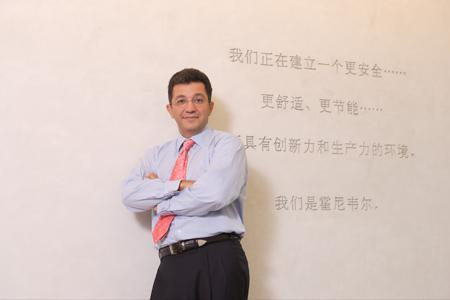
Shane Tedjarati, president and chief executive officer, China and India, Honeywell International Inc. [Photo / China Daily]
President and CEO for China and India boosted the former's operational value 5-fold in 7 years
BEIJING - Fluent in six languages and an avid pilot, Shane Tedjarati could easily pass as a cool guy in the arts or as a sportsman.
However, the Montreal native is running Honeywell International Inc's high growth markets.
Tedjarati, president and chief executive officer of the global conglomerate's China and India unit, has led the China operation to grow five times in value since he took office in 2004.
On a van trip from Shanghai to Hangzhou in January 2005, Tedjarati convinced the boardroom to create the firm's first product approval committee outside the United States.
Honeywell produces a variety of technologies and solutions including aerospace products, automation and control technologies, and specialty materials for customers, from end consumers to major corporations and governments.
"We were talking about why we were not succeeding in this thing or that. Then we decided to set up the committee in Shanghai. That is how our world changed," he recalled.
The move involved making all decisions for their business in China. It included a strategy to tap the middle- and low-end of the market in a world that traditionally sees multinationals as stronger in high-end products.
At the beginning, Honeywell China only had products designed in the West and sold to China. When they tried to sell a product priced 3,000 yuan ($463), their Chinese customers wanted a range between 100 to 3,000 yuan.
Now, for that product category, Honeywell has a catalog that has products from 80 yuan to 3,000 yuan in the country.
People in the company were worried about whether the made-in-China technology would meet global standards, and whether the products were of the right quality and safety. Tedjarati banished the doubters with staggering numbers.
In the past few years, revenues from product innovations originated in China have grown at an average annual rate of more than 40 percent.
"Even our low-end products can make the same income margin as our most expensive product. We make money in places we could never have imagined," he said.
Of course, it is never easy to turn around a big tanker of a company that employs about 130,000 people in 100 countries and had first quarter sales of $8.9 billion.
Tedjarati spent the first few years laying the foundations for rapid growth.
"We were able to change the culture and direction of the company," he said. "We are also the biggest contributor to growth and profitability. If you don't do both, people won't believe you."

Honeywell International Inc products displayed at an electronics and machinery exhibition in Shanghai. [Photo / China Daily]
Colorful life
Behind his globe-trotting lifestyle and endless meetings and correspondence, Tedjarati has lived a colorful life.
He holds a commercial pilot certificate, which allows him to fly frequently to countries such as the Philippines with his 17-year-old son. He is now applying to sit for China's first exam and likely to become the first foreigner to be awarded a commercial pilot qualification in China.
Last year, he served as the cameraman to assist his daughter Tara, now 13, in interviewing people at the 2010 World Expo in Shanghai. The proud father shared the video link on Youtube and Tudou.
The video shows the young anchor has inherited her father's linguistic skills by greeting the audience in several languages. Her brilliant smile shows she has also inherited his charisma.
Tedjarati lives in Shanghai, China, a country he had joked to his family while in his 20s that was the last place on Earth he imagined he would visit.
Having visited China regularly since 1992, Tedjarati was recently offered a green card numbered 31 - a rare recognition of an expatriate's contribution or a reward for staying with the changes.
Back in the early 1990s when he was a language student at a university in Hangzhou, Zhejiang province, it was difficult to find a telephone booth that offered international services.
Once, after having waited for days for a fax from his mother in Montreal, he approached the local foreign affairs office.
They told him a document written in French took longer for the authority to review because it requires translation from French into English and then from English to Chinese.
"They suggested it would be quicker for my mother to fax in English rather than in French next time," Tedjarati recalled.
Twenty years later, more than 900 million people in China use cell phones. Witnessing the dramatic changes gives Tedjarati a great perspective on China's culture and macro trends.
Tedjarati, who speaks Mandarin, joked he probably is the Westerner who visited the most Chinese companies - 400 - during his consulting days.
A natural icebreaker and deal nurturer, he sends out a message that he really understands the business code in China. His know-how and the go-to-market strategy have shaped Honeywell China's guiding principles.
Honeywell has transformed from a West-to-East import model to an East-for-East model. It means manufacturing and sourcing as well as research and development are all executed locally to meet the needs and requirements of all segments of the local market.
Tedjarati said it is crucial to make sure the technologies Honeywell offers are in line with China's needs. Because many of China's challenges are unique, they require the ability to create genuine solutions. The company has designed fuel-efficient, environmentally friendly and security-enhanced products to meet the country's rising challenges during its rapid urbanization.
Its automation control system in buildings helps people save energy but without compromising the quality of life. Its turbo-charger in a vehicle's engine reduces 20 to 40 percent of emissions and energy consumption but does not affect the car's performance.
He added: "We are making China become part of the whole value chain of innovation, design and creation of new technology for making human life better."
Chinese market
In succeeding in China, one can succeed in the rest of the global market.
China has shared many common trends with other emerging economies that will together generate about 60 to 80 percent of global growth in the next decade, said Tedjarati.
The Chinese economy has become a platform for innovation and globalization thanks to unbalanced development that incorporates three or four economies and that leads to solutions in the developed world or less developed regions.
Having closely studied Chinese companies for years, Tedjarati has seen the rise of their Chinese peers. For example, many Chinese enterprises, which used to compete in home electronic appliances 20 years ago, have moved up to high-tech fields including solar energy.
"It happens to every industry. Chinese companies will become leaders first in China and then in the world," he said. "Our biggest competitor is China Inc." He said the understanding of the market of local companies is better than that of multinationals which use the world's leading analysis systems.
"The Chinese companies actually have people living with customers as Chinese customers' needs change so fast that some don't even know what they want," he said.
"We are able to satisfy China's needs at China's speed at China's cost like the best of the best Chinese companies can," he said.
For example, in a new partnership such as the making of China's first commercial plane or the C919 project - a $16 billion contract with Shanghai-based Commercial Aircraft Corporation of China Ltd - the company recognized there was a lot that can be adapted from how local competitors think and operate.
From last year, Honeywell stopped measuring its business performance only against multinationals in China such as Eaton Corp, General Electric Company and Siemens AG, he said, "because we know how to compete with them".
Q & A | Shane Tedjarati
Q: How do you spend your weekend amid your busy schedule?
A: With family. Community service. Flying home-made rockets and small planes. Making small video clips about Shanghai.
What did you do when you first received your Chinese green card?
Felt very emotional and proud. I've lived in China longer than any other country and I felt it's now time I have this green card.
How will you celebrate when you become the first expat in China to possess a Chinese pilot certificate?
I will try to find a place to take my assistant and my friends flying in China. Later, I want to start the first professionally run flying club and teach young Chinese to fly.
What's your favorite restaurant or food in China?
Simply Thai for Asian Food. Sichuan food for Chinese food (South Beauty).
What book are you reading?
Failure is not an option.
What is the Chinese saying or word that you like the most? And Why?
Dao Ke Dao Fei Chang Dao (genuine law cannot be expressed). So simple, yet so profound. It's at the heart of understanding the reality of the world and the Chinese mindset.
What places in China you want to explore or recommend to expats?
Silk Road, Tibet.
What's the best way to break the ice with a Chinese businessman at a first meeting?
Find a common place, food or people you know. Food typically does it better than anything else.
Also, knowing their home city (especially if it is in remote areas). They get impressed by that.
Three words to describe your impression of Chinese businessmen?
Opportunistic, entrepreneurial and hard-working.
What experience in China has shaped your thoughts the most?
The fast pace of change, the flexibility and adaptability of the people, the sense of positive energy and desire to get better and the emphasis on long-term relationships and friendships.
What is the thing you want to do the most but have not found time to do?
Write my book.





